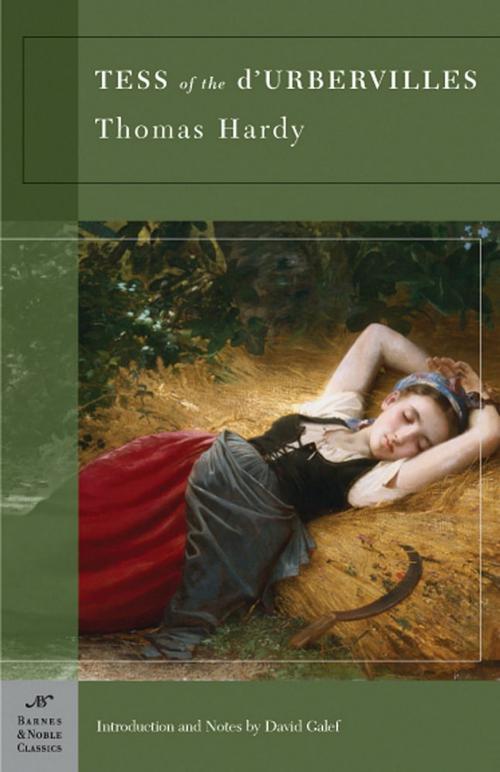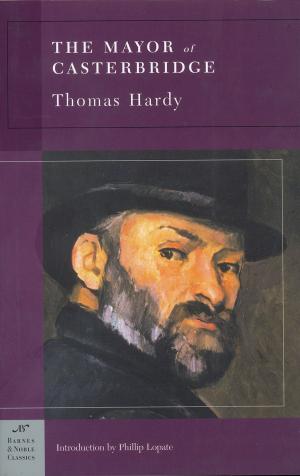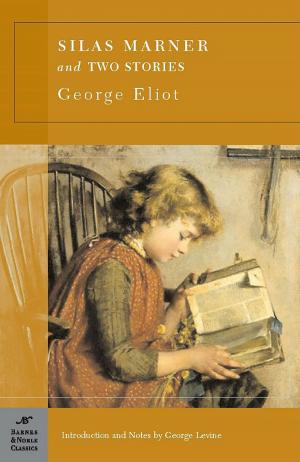| Author: | Thomas Hardy, David Galef | ISBN: | 9781411433267 |
| Publisher: | Barnes & Noble Classics | Publication: | June 1, 2009 |
| Imprint: | Barnes & Noble Classics | Language: | English |
| Author: | Thomas Hardy, David Galef |
| ISBN: | 9781411433267 |
| Publisher: | Barnes & Noble Classics |
| Publication: | June 1, 2009 |
| Imprint: | Barnes & Noble Classics |
| Language: | English |
Tess of the d'Urbervilles, by Thomas Hardy, is part of the Barnes & Noble Classics* *series, which offers quality editions at affordable prices to the student and the general reader, including new scholarship, thoughtful design, and pages of carefully crafted extras. Here are some of the remarkable features of Barnes & Noble Classics:
- New introductions commissioned from today's top writers and scholars
- Biographies of the authors
- Chronologies of contemporary historical, biographical, and cultural events
- Footnotes and endnotes
- Selective discussions of imitations, parodies, poems, books, plays, paintings, operas, statuary, and films inspired by the work
- Comments by other famous authors
- Study questions to challenge the reader's viewpoints and expectations
- Bibliographies for further reading
- Indices & Glossaries, when appropriate
All editions are beautifully designed and are printed to superior specifications; some include illustrations of historical interest. Barnes & Noble Classics pulls together a constellation of influences—biographical, historical, and literary—to enrich each reader's understanding of these enduring works.
Highly controversial because of its frank look at the sexual hypocrisy of Victorian society, Thomas Hardy’s Tess of the D’Urbervilles was nonetheless a great commercial success when it appeared in 1891. It is now considered one of the finest novels in English.
Using richly poetic language to frame a shattering narrative of love, seduction, betrayal, and murder, Hardy tells the story of Tess Durbeyfield, a beautiful young woman living with her impoverished family in Wessex, the southwestern English county immortalized by Hardy. After the family learns of their connection to the wealthy d’Urbervilles, they send Tess to claim a portion of their fortune. She meets and is seduced by the dissolute Alec d’Urberville and secretly bears a child, Sorrow, who dies in infancy. A very different man, Angel Clare, seems to offer Tess love and salvation, but he rejects her—on their wedding night—after learning of her past. Emotionally bereft, financially impoverished, and victimized by the self-righteous rigidity of English social morality, Tess escapes from her vise of passion through a horrible, desperate act.
With its compassionate portrait of a young rural woman, powerful criticism of social convention, and disarming consideration of the role of destiny in human life, Tess of the D’Urbervilles is one of the most moving and memorable of Hardy’s novels.
David Galef has published nine books: the novels Flesh and Turning Japanese; two children's books, The Little Red Bicycle and Tracks; two translations of Japanese proverbs, Even Monkeys Fall from Trees and Even a Stone Buddha Can Talk; a work of literary criticism, The Supporting Cast; an edited anthology of essays called Second Thoughts: A Focus on Rereading; and, most recently, the short-story collection Laugh Track. In addition, he has written more than seventy short stories for magazines ranging from the British Punch to the Czech Prague Revue, the Canadian Prism International, and the American Shenandoah. His essays and reviews have appeared in the New York Times, Newsday, the Village Voice, Twentieth Century Literature, The Columbia History of the British Novel, and many other places. He is a professor of English at the University of Mississippi, where he also administers the M.F.A. program in creative writing.
Tess of the d'Urbervilles, by Thomas Hardy, is part of the Barnes & Noble Classics* *series, which offers quality editions at affordable prices to the student and the general reader, including new scholarship, thoughtful design, and pages of carefully crafted extras. Here are some of the remarkable features of Barnes & Noble Classics:
- New introductions commissioned from today's top writers and scholars
- Biographies of the authors
- Chronologies of contemporary historical, biographical, and cultural events
- Footnotes and endnotes
- Selective discussions of imitations, parodies, poems, books, plays, paintings, operas, statuary, and films inspired by the work
- Comments by other famous authors
- Study questions to challenge the reader's viewpoints and expectations
- Bibliographies for further reading
- Indices & Glossaries, when appropriate
All editions are beautifully designed and are printed to superior specifications; some include illustrations of historical interest. Barnes & Noble Classics pulls together a constellation of influences—biographical, historical, and literary—to enrich each reader's understanding of these enduring works.
Highly controversial because of its frank look at the sexual hypocrisy of Victorian society, Thomas Hardy’s Tess of the D’Urbervilles was nonetheless a great commercial success when it appeared in 1891. It is now considered one of the finest novels in English.
Using richly poetic language to frame a shattering narrative of love, seduction, betrayal, and murder, Hardy tells the story of Tess Durbeyfield, a beautiful young woman living with her impoverished family in Wessex, the southwestern English county immortalized by Hardy. After the family learns of their connection to the wealthy d’Urbervilles, they send Tess to claim a portion of their fortune. She meets and is seduced by the dissolute Alec d’Urberville and secretly bears a child, Sorrow, who dies in infancy. A very different man, Angel Clare, seems to offer Tess love and salvation, but he rejects her—on their wedding night—after learning of her past. Emotionally bereft, financially impoverished, and victimized by the self-righteous rigidity of English social morality, Tess escapes from her vise of passion through a horrible, desperate act.
With its compassionate portrait of a young rural woman, powerful criticism of social convention, and disarming consideration of the role of destiny in human life, Tess of the D’Urbervilles is one of the most moving and memorable of Hardy’s novels.
David Galef has published nine books: the novels Flesh and Turning Japanese; two children's books, The Little Red Bicycle and Tracks; two translations of Japanese proverbs, Even Monkeys Fall from Trees and Even a Stone Buddha Can Talk; a work of literary criticism, The Supporting Cast; an edited anthology of essays called Second Thoughts: A Focus on Rereading; and, most recently, the short-story collection Laugh Track. In addition, he has written more than seventy short stories for magazines ranging from the British Punch to the Czech Prague Revue, the Canadian Prism International, and the American Shenandoah. His essays and reviews have appeared in the New York Times, Newsday, the Village Voice, Twentieth Century Literature, The Columbia History of the British Novel, and many other places. He is a professor of English at the University of Mississippi, where he also administers the M.F.A. program in creative writing.















